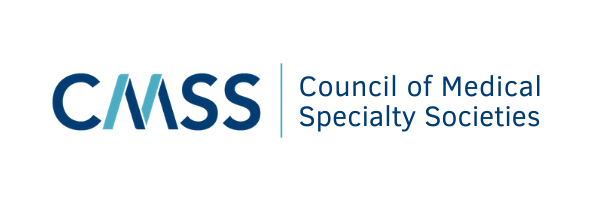CDC Awards Cooperative Agreement to the CMSS and Specialty Society Partners to Improve Adult Immunization Rates for High-Risk Adults
Chicago, IL (October 1, 2021) –
The Centers for Disease Control and Prevention (CDC) recently awarded a cooperative agreement to the Council of Medical Specialty Societies (CMSS), a coalition of 45 specialty societies representing more than 800,000 physicians across healthcare, to improve vaccination among high-risk adults.
This five-year cooperative agreement includes $22 million in funding in the first year (with an estimated $55.5 million over five years) to support increased COVID-19, influenza, and routine vaccinations in high-risk adults with chronic medical conditions, including patients with chronic obstructive pulmonary disease, asthma, diabetes, heart disease, cancer, and chronic kidney disease, as well as older adults and staff in occupational health settings.
“CMSS leadership is heartened that CDC recognized the incredible reach of CMSS member specialty societies and the importance of including many physician groups with important patient relationships in vaccination efforts,” said Darilyn Moyer, MD, FACP, President of CMSS and Executive Vice President and Chief Executive Officer of the American College of Physicians (ACP). “CMSS is perfectly positioned to help get many more patients vaccinated in our country.”
CMSS will serve as the lead organization for this project and serve as a catalyst to work with 45 member societies, seven collaborating subspecialty members, and partnering healthcare systems to incorporate the CDC Standards for Adult Immunization Practice into clinical care and drive adult immunization through education, dissemination, and quality improvement initiatives.
CMSS is pleased to partner with seven of our member subspecialty societies who care for these patient populations to support this important work:
- American Association of Clinical Endocrinology (AACE)
- American College of Cardiology (ACC)
- American College of Occupational and Environmental Medicine (ACOEM)
- American Geriatrics Society (AGS)
- American Society of Clinical Oncology (ASCO)
- American Society of Nephrology (ASN)
- American Thoracic Society (ATS)
Since 2014, CDC’s Standards for Adult Immunization Practice noted the critical role that all health professionals play in assessing, recommending, administering or referring for vaccination, and documenting vaccination. While vaccination is a core element of the review of clinical preventive services in primary care, specialists may not prioritize vaccination assessment and administration. Specialty societies that care for patients with chronic illness can provide more targeted continuing education and clinical guidance to ensure that specialty physicians play a greater role in immunization of these high-risk patients.
These seven collaborating specialty societies have remarkable reach and extensive expertise in national quality improvement initiatives, including targeted continuing education and outreach to drive vaccination for at-risk adult populations. Each has long-standing relationships with health systems and clinics that will be the backbone of this improvement initiative.
“Physicians look to their specialty societies for up-to-date clinical guidance that shapes practice and drives improvement,” said Helen Burstin, MD, MPH, MACP, CEO of the Council of Medical Specialty Societies. “We are very pleased to partner with CDC and our member societies across the house of medicine to improve vaccination for high-risk adults.”
Read more about the cooperative agreement.
###
About the Council of Medical Specialty Societies:
The Council of Medical Specialty Societies (CMSS) is a coalition of specialty societies representing more than 800,000 physicians across the house of medicine. CMSS works to catalyze improvement across specialties through convening, collaborating, and collective action. For more information, visit www.cmss.org.
Media Contacts:
- CMSS: Julia Peterson, Operations Manager, jpeterson@cmss.org
- AACE: Katie Maassen, Director, Marketing and Engagement, kmaassen@aace.com
- ACC: Nicole Napoli, Director, Media Relations, nnapoli@acc.org
- ACOEM: Julie Ording, Manager, Programs, jording@acoem.org
- AGS: Lauren Kopchik, Manager, Communications, lkopchik@americangeriatrics.org
- ASCO: Melissa Lee, Manager, Public Affairs and Advocacy Communications, melissa.lee@asco.org
- ASN: Christine Feheley, Press Officer, cfeheley@asn-online.org
- ATS: Dacia Morris, Director, Communications & Marketing, Dmorris@thoracic.org